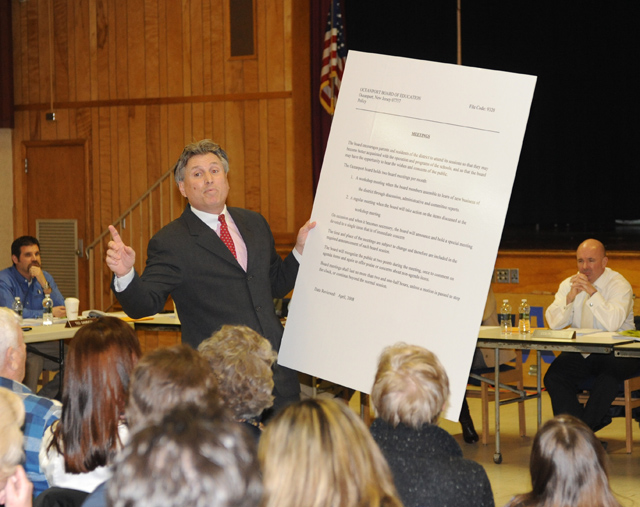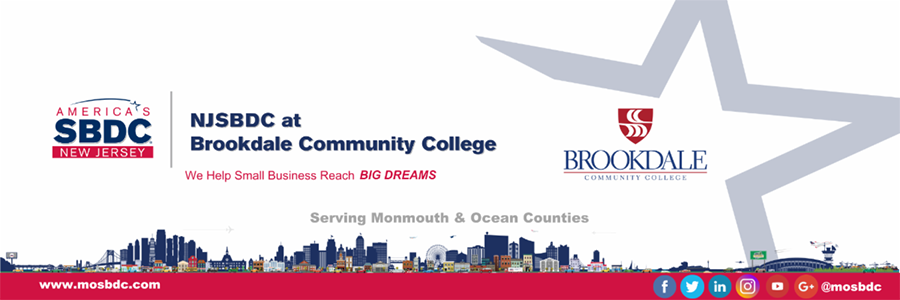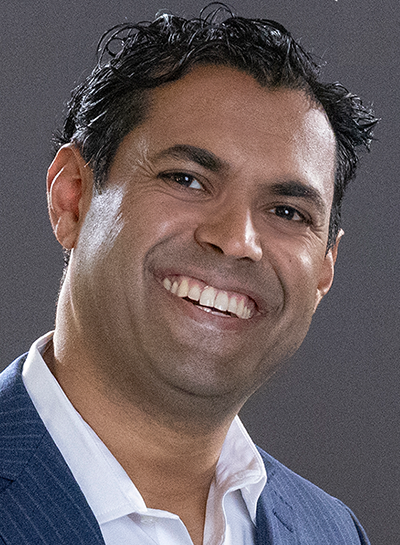Group adopts beach access point by Tradewinds
February 23, 2012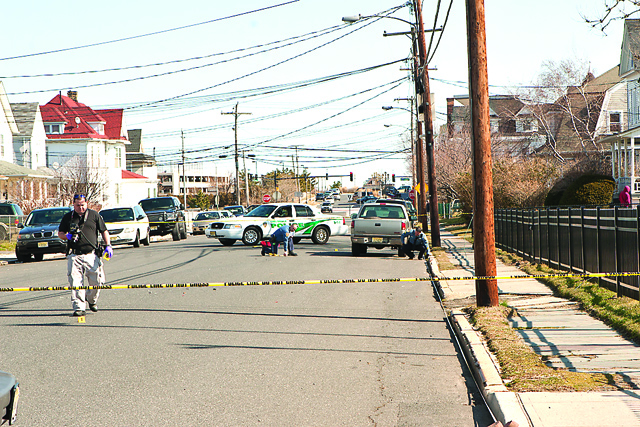
Man charged with attempted murder
February 23, 2012By Walter J. O’Neill, Jr.
Oceanport — Over 100 residents packed the normally quiet Board of Education meeting last week to urge its members not to move the elections from April to November. Several times during the evening the meeting appeared to get out of control.
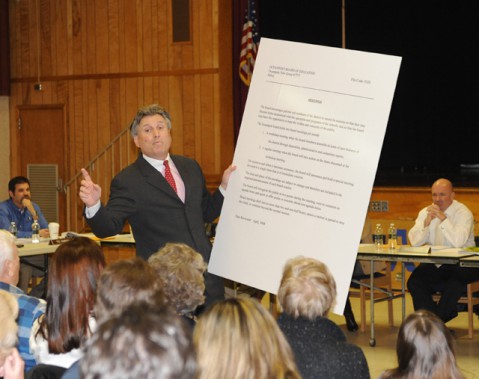
Oceanport resident and private attorney Jay Coffey holds up a huge printout of the Oceanport Board of Education policy on holding public meetings. Coffey contested that a vote taken a workshop meeting last week was improper.
January 17, Governor Chris Christie signed a bill that ended 100 years of election history in the state. School districts had presented their budgets and the candidates for vote in April. The new law allowed boards to switch to November. The logic was that only about 15 percent of voters show up at the polls in April for an election that costs state taxpayers millions of dollars.
If school districts moved the election to November and kept their budgets under a 2 percent cap that Christie imposed, then no vote would be required on the budget.
The New Jersey Department of Education had imposed an “unofficial” deadline of Friday, February 17 to decide on the move. New Jersey School Boards Association indicates that 413 of the 538 districts statewide have made the change.
But two weeks ago, when the Oceanport Board voted to make the change at a workshop meeting, it sparked outrage.
Board member Mark O’Neill was upset that the administration had moved the vote during the workshop session, saying it had not been properly reviewed.
“This matter of moving the vote was never presented to a committee.”
As a member of the policy committee, O’Neill said he should have seen this matter first. “When the workshop agenda came out the superintendent stated that the legislative committee had reviewed the matter. We don’t have a legislative committee,” said O’Neill. “When I questioned Andrew Orefice, Superintendent of Schools, about that he stated he did not know where to place it so he put it under that committee.”
Kelly McGowan, President of the Board, stated that if the elections were moved to November it would save the Oceanport residents at least $10,000 in election costs and more people would show up to vote.
O’Neill said that if the election is moved he feels the administration and a majority of the board would raise the taxes as much as possible while staying below the cap imposed by Christie.
“That means $180,000 increase next year and the residents will be taxed without representation,” said O’Neill, who used the word “damn” in his remarks several times, which upset a few people.
McGowan was upset with the remark “taxation without representation” and said they listened to the community and that is why they were taking the vote a second time at the public meeting.
“We heard that people were upset and we are giving them an opportunity tonight to express themselves,” said McGowan. “The last election only 300 people showed up to vote, when it’s moved to November more people will be able to pick their representation.”
Jay Coffey, a private attorney, had questioned if the board’s practice of voting at workshop meetings is proper. “The board’s position has been that they can vote at workshop meetings because the Open Public Meetings Law doesn’t expressly forbid voting at workshop meetings. They are right about that,” said Coffey. However, he explained that law never actually uses the word “workshop” in the statute.
The board’s own policy states that the public will only be able to participate at regular public meetings. In fact, Coffey made a huge poster of this part of the policy. As he approached the board panel, Colin Soyer, Vice President, rolled his eyes and Chris McCrae made a bowing gesture as if Coffey was a deity.
It was disrespectful, according to Coffey who said he was only attempting to point out the inaccuracy in their policy. The policy reads that the board encourages parents and residents of the district to attend its sessions. It also says that the board may have the opportunity to hear the wishes and concerns of the public.
It was the understanding of most residents at the meeting that the policy clearly states that action is only taken at regular meetings, where the general public is allowed input.
McGowan stated that the board, when it took the vote the week before at a workshop meeting, did nothing illegal. “Our attorney advised us that we were within our right,” said McGowan.
Board Attorney R. Armen McOmber was having a legal debate with Coffey, when Soyer stood up and walked over to the large printout provided by Coffey. Soyer then asked Coffey where in the policy does it state that they can’t vote at a workshop.
“This is your opinion, and this is not a court, and you’re not in front of a judge,” said Soyer.
After more discussion, the board decided to take a new vote after they gave the public the opportunity to address them on this matter.
Bob Kelly, an Oceanport resident, stated that if the board really wanted to know how the resident felt he would take a straw poll. When the audience was asked who was against the move, the room erupted with thundering applause. As one person pointed out that a third of the 300 who voted last year just told the board not to change its election date.
John A. Patti, another attorney from Oceanport, addressed the board. “This has nothing to do with money. It has to do with you taking away our right to vote,” said Patti. He stated that if the election is moved all it means is that the board will reach into his pockets and take his money without asking.
Arthur Smith, who has lived in Oceanport since 1984, was very upset with the board of education. He pointed out how most of them seemed upset or bothered that the residents didn’t want to change the election date. “They are taking away our right to vote,” said Smith. “They are not asking how we feel.”
McGowan stated that they were listening to the residents, that is why they were holding the open questions and answer period. McCrea, who seemed to be getting frustrated with the conversations, took his turn answering questions.
“Why do you move to this town?” asked McCrea. “Do you think having great schools keeps your property values up? Do you think that’s why people want to stay here, want to live here, want to raise their families here? Or is it because the budgets get slashed, half the teachers go, we’ve got no band, we’ve got no play?”
McCrea also asked how many times teachers would take a zero percent increase in salary. His view was that the good teachers will leave and the children will suffer.
McGowan stated that the board of education oversees the administration and if a budget increase is asked for, it’s the responsibility of the board members to make sure the money is not mishandled or misused.
“This vote does not mean an automatic two percent increase every year, although according to the law enacted we have the right to do so,” said McGowan.
O’Neill strongly disagreed with his colleague. “I think the mindset of the administration could shift from that of justifying spending to that of informing us of how they will spend our money,” said O’Neill. “That is a very different mindset.”
When McGowan called for a new vote, Spencer Carpenter, Ted Gammon, Chris McCrae, William McVitty, Joan Osgoodby, Colin Soyer and Kelly McGowan voted to move the election from April to November. Voting to keep the election in April were Dr. Madeline Badalaty and Mark O’Neill.
“I have no problem with the vote from a procedural standpoint tonight,” said Coffey. “Philosophically, I couldn’t disagree more with them. But the proper processes of representative government were observed. There was a public hearing, proper notice and the board engaged in discussion prior to its vote.”
“But the majority of the board, especially Mr. McCrae, was pretty clear that their allegiances are not with the taxpayer, but rather with the administration on this issue. Why they couldn’t wait a year to see how it worked for every other municipality who chose to move it, I’ll never know.”
That night following the vote someone slashed the tires on O’Neill’s car which was parked in his driveway. Responding police officers told O’Neill that it appeared his vehicle was the only one targeted that night in a select act of vandalism.
Originally published Feb. 23, 2012


